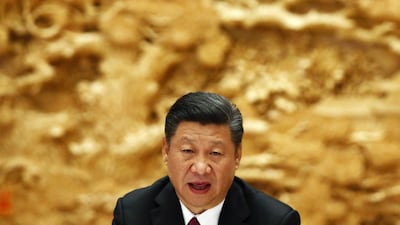After the news broke that China's Communist Party was proposing the two-term limit on the country's presidency be scrapped, the condemnation followed thick and fast in the western media. "'Dictator for life': Xi Jinping's power grab condemned as step towards tyranny," wailed the headline in the Guardian. "President Xi's strongman rule raises new fears of hostility and repression," warned the New York Times, while Time magazine said that the move "should worry us all".
The degree of shock expressed was surprising, if not disingenuous, given that after the National Congress of the Communist Party last October, speculation was rife that Mr Xi would continue in power after what has become the traditional 10 years at the top. Mr Xi could already have continued as party general secretary and chairman of the Central Military Commission or ruled from behind the scenes as Deng Xiaoping did. Removing limits on holding the presidency just clarifies the likely future course of China's leadership.
And why should that prove so worrying? There is nothing set in stone about a decade being the optimal length of time for anyone to be in power. Some of the 20th century’s most successful leaders were in office for far longer. Franklin Roosevelt, who many consider to have been America’s greatest-ever president, won the White House a record four times and would have racked up 16 years there, had he not died in office. Singapore’s Lee Kuan Yew was prime minister for 31 years while India’s Jawarharlal Nehru was premier for 17 years, a period that could have been considerably extended had he not passed away in office too.
Term limits, on the other hand, diminish incumbents as their expiry dates approach. Even critics of Mr Xi admit this. As the Financial Times's Jamil Anderlini wrote, in an article bemoaning the change, Mr Xi's two predecessors Jiang Zemin and Hu Jintao spent their second terms "trying to cement a legacy, while responding to frequent crises and fighting lame-duck status as their anointed successor rose in prominence".
The question about long-serving leaders is how they use the greater ability they have to shape their countries for the longer term. I would argue that on many fronts, the rest of the world should be pleased, not dismayed, that it looks as though Mr Xi is here to stay.
The anti-corruption drive he instigated has snared both “tigers” and “flies” and appears to be increasing both in scope and in capability. The number of cadres disciplined by the Communist Party in January – 4,327 – was up 45 per cent year on year and a new anti-corruption “super-ministry” is due to be set up next month. As Daniel Bell, professor at Tsinghua University, wrote: “The anti-corruption drive is changing the way public officials do business. Any sensible official will now think twice before accepting a bribe.” Surely this is to be welcomed? It certainly would be in any other developing country.
On climate change, China under Mr Xi has stepped up as Mr Trump’s America has retreated. Also at the last party congress, he said that he would “encourage simple, moderate, green and low-carbon ways of life”. These are not just words. Many targets have been set; green finance pilot zones have been set up and 6,000 officials were punished for flouting environmental guidelines in 2016 alone.
Similarly, at Davos last year, Mr Xi impressed the World Economic Forum by defending globalisation, free trade and open markets at precisely the time when many feared the consequences of Mr Trump’s professed disdain for all three.
And Mr Xi's signature One Belt, One Road Initiative is set to have profound and transformative effects on a vast span of the Eurasian landmass. (In some unexpected places too; according to a recent report, China is expected to be the biggest foreign investor in Serbia this year.)
It is true that in the past there have been concerns that Chinese investments have not benefited host countries as much as desired. The case of Hambantota port in Sri Lanka – built with Chinese loans which could not be serviced, leading to the port later being handed over on a 99-year lease to a Chinese state-owned company – has caused much wariness.
But the loan and the project predate Mr Xi. There is evidence that China is more aware now that joint ventures with other countries must be seen to be good for both parties. In Malaysia, for instance, 4,000 new jobs are due to be created in the Kuantan industrial park run by the two countries. Allaying fears that these will all go to imported Chinese workers, it has just been announced that 70 per cent will be reserved for Malaysians.
In short, China is neither a democracy nor a liberal society and is clearly not heading in that direction, whoever leads it. Mr Xi has promoted a series of policies that objective observers ought to applaud and in an uncertain world, he has projected strength and stability. As his biographer Kerry Brown asks, would we really prefer “an uncertain, weak Beijing leadership where no one is quite certain who has final say?”
Should Mr Xi turn into a Mugabe or a Mao, then there would be cause for distress. But as there is no evidence he is likely to do so, one can’t help but smell a whiff of Sinophobia about the criticism. If any other leader was promoting sustainability, cracking down on corruption and promoting a huge new trade and infrastructure development, the world would be keen to see that leadership continue. So why not Mr Xi?
Sholto Byrnes is a senior fellow at the Institute of Strategic and International Studies Malaysia


